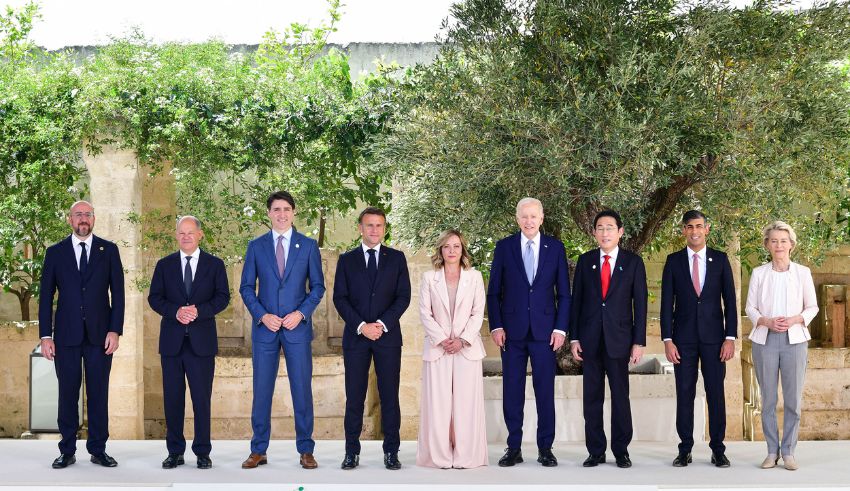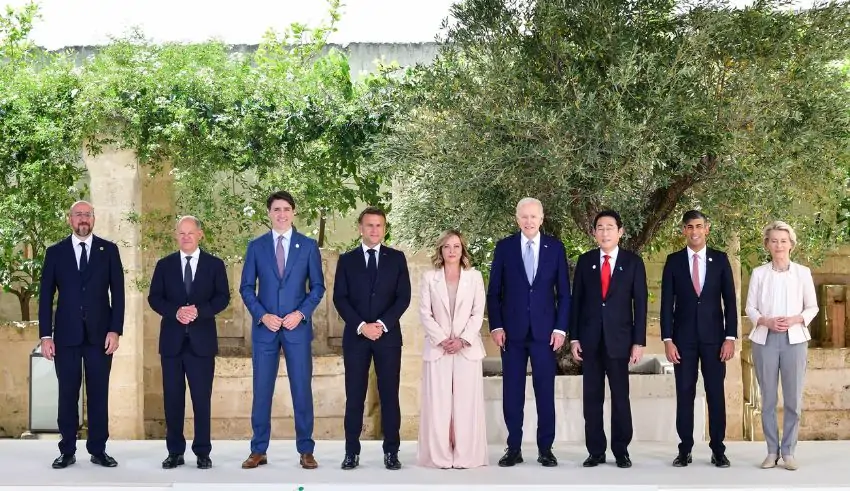

(C) G7 Italy
Last updated on June 17th, 2024 at 02:14 pm
Particularly with relation to the Philippines and China’s continuous conflict, the G7 leaders have shown a united opposition against the forceful activities in the South China Sea. They have underlined once more their great worry about the current state of affairs and their strong resistance to any unilateral force-based transformation of the status quo.
The United Nations Convention on the Law of the Sea (UNCLOS) is underlined by the leaders as crucial for establishing the legal framework controlling all kinds of activity on the oceans and seas. Globally, UNCLOS is acknowledged as the complete legal framework defining countries’ rights and obligations towards the world’s oceans, therefore encouraging the peaceful use of marine resources and the fair and effective exploitation of the seas.
Moreover, the G7 has underlined that the 2016 arbitral tribunal ruling is legally binding and a good starting point for amicably settling conflicts. Reversing China’s expansive claims in the South China Sea, this decision by the Permanent Court of Arbitration in The Hague confirmed the Philippines’ sovereign rights over her exclusive economic zone (EEZ). Through strong support of this prize, the G7 emphasizes the need of following international legal rulings in preserving world marine order.
Opposing China’s militarized and coercive operations in the area, the G7 has denounced the rising use of risky maneuvers and water cannons against Philippine vessels. China’s aggressive policies have given serious safety and security issues. The G7 leaders have denounced these acts, stressing the need of all countries avoiding provocative policies that can raise tensions and cause possible wars.
Apart from challenging these risky actions, the G7 has also warned Beijing to halt militarizing the South China Sea and voiced support for the international arbitral verdict voiding China’s huge territorial claims. Apart from endangering the regional security architecture, the militarization include the building of artificial islands with military installations and the deployment of military equipment, therefore compromising the freedom of navigation and overflight that UNCLOS seeks to defend.
Acknowledging the Philippines’ claim over an extended continental shelf in the West Philippine Sea, the G7 leaders have showed great support for the nation before the United Nations Commission on the Limits of the Continental Shelf (CLCS). This action is a major declaration of the Philippines’ maritime rights and a step towards confirming its sovereignty over her sea resources.
Maintaining the balance of power in the area depends critically on the G7 supporting of the efforts of the Philippines to exercise its maritime rights. This backing emphasizes the G7’s will to guarantee that international maritime norms are observed and maintained as well as that less developed countries are not pushed by more strong neighbors.
The G7’s proposal to handle the South China Sea problem combines diplomatic assistance with a clear caution against more militarization and coercion together with reaffirmation of international law. The leaders want to help to bring about a peaceful solution preserving regional stability and honoring national sovereignty.
The G7’s consistent posture sends a strong message to the world community on the need of preserving the rule of law and the need of settling problems by peaceful methods. The G7 aims to guarantee that the South China Sea stays a territory of peace, stability, and cooperative international involvement by pushing for adherence to international legal frameworks like UNCLOS and backing the legal activities of the Philippines. .
Furthermore, the strong resistance of the G7 to militarization in the South China Sea and coercive activities shows a more general dedication to world peace and security. Their method stresses respect of sovereignty, legal resolution, and communication, so guiding the treatment of like conflicts all around. By means of these steps, the G7 seeks to open the path for enduring peace and collaboration in one of the most strategically important areas of the world.
The posture of the G7 also affects world security and international marine law more broadly. Apart from resolving the immediate problem in the South China Sea, the G7 is strengthening the values that control world affairs by opposing coercive policies and endorsing the rule of law. Globally, this dedication to maintaining legal systems and opposing unilateral actions establishes a vital model.
Furthermore, the activities of the G7 are probably going to affect the policies and actions of other countries on marine conflicts. The G7 is supporting other nations to defend their legal rights and pursue peaceful solutions by supporting the Philippines and contesting China’s broad assertions in international arbitration. Under this strategy, conflicts are resolved based on law instead of force, therefore fostering a more steady and predictable world order.
The G7’s involvement in the South China Sea problem going ahead will call for constant diplomatic work and regional partner coordination. Essential will be strengthening relationships and developing a coherent plan to handle China’s activities. This covers improving maritime security cooperation, running combined naval exercises, and boosting diplomatic interactions with nations of ASEAN.
Moreover, the G7 should keep endorsing programs aimed at capacity-building that enable less developed countries defend their marine rights. Giving technical support, surveillance tools, and training will enable these nations to more successfully monitor and defend their waterways.
In the end, the way the G7 handles the South China Sea conflict emphasizes the need of group effort and world cooperation in handling world problems. Together and in favor of the rule of law, the G7 leaders are striving for a more fair and peaceful world in which national sovereignty is honored and disputes are settled by legal methods and dialogue.
The NBA Playoffs of 2025 would have much perdition during the matches of the second round. In the East, the…
Jimmy O.Yang, the Asian standup comedian established his name in the international stage and he is more popular among the…
Bill Gates of the Bill & Melinda Gates Foundation declared during the Philanthropy Asia Summit on May 5, 2025 that…
The game changer of the Netflix streaming is the South Korean nail biting survival thriller web series “Squid Game” and…
BLACKPINK is planning their fourth concert tour across the globe and their brand-new album for release in 2025. Member Lisa…
The 2024-2025 BOC Life Hong Kong Premier League is a different league which is structured with triple-round robin competition every…
This website uses cookies.
Read More